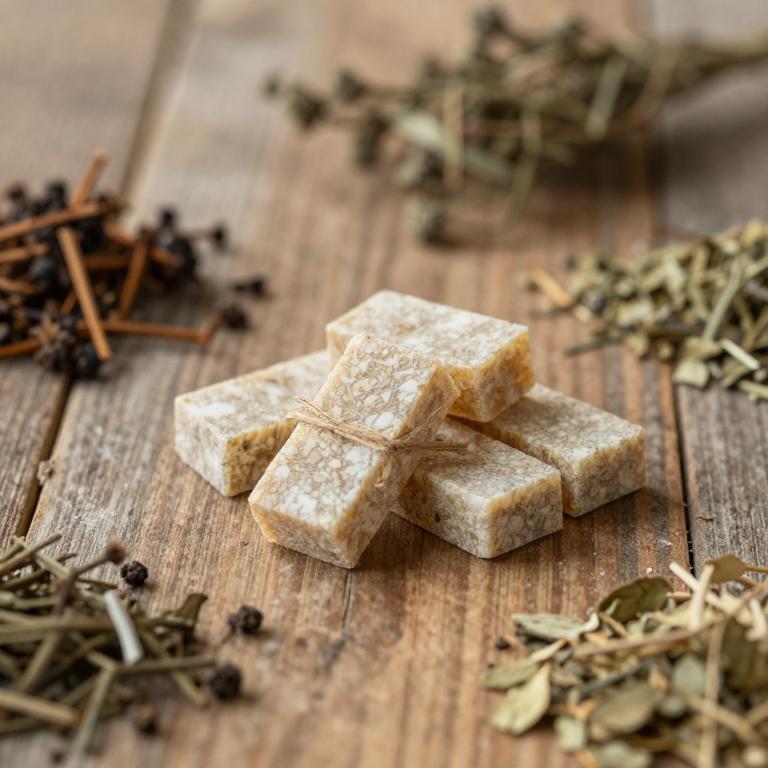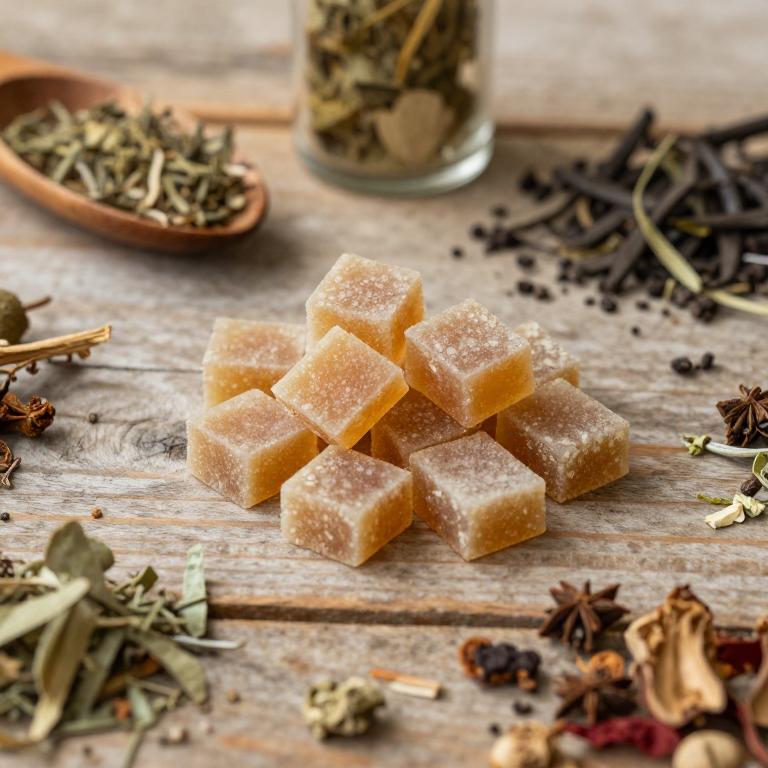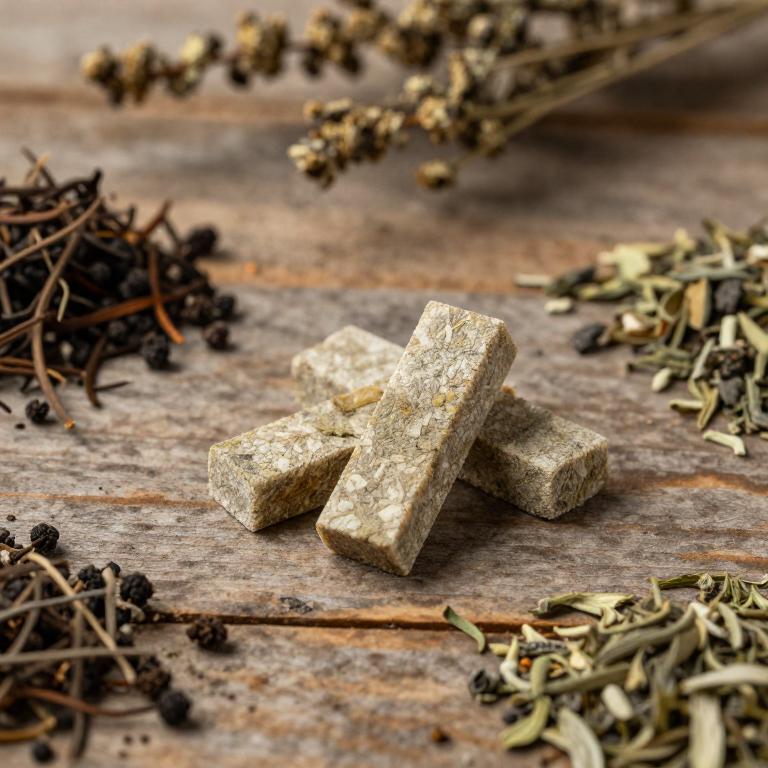10 Best Herbal Lozenges For Vomiting

Herbal lozenges for vomiting are natural remedies that incorporate plant-based ingredients to help alleviate nausea and motion sickness.
These lozenges often contain herbs such as ginger, peppermint, and licorice root, which are known for their soothing and anti-emetic properties. They work by calming the digestive system and reducing the sensation of queasiness, making them a popular alternative to conventional medications. Many people prefer herbal lozenges due to their mild side effect profile and the absence of synthetic chemicals.
However, it is important to consult a healthcare professional before using them, especially for prolonged or severe cases of vomiting.
Table of Contents
- 1. Ginger (Zingiber officinale)
- 2. Fennel (Foeniculum vulgare)
- 3. Black pepper (Piper nigrum)
- 4. Cumin (Cuminum cyminum)
- 5. Ceylon cinnamon (Cinnamomum verum)
- 6. Peppermint (Mentha piperita)
- 7. Licorice (Glycyrrhiza glabra)
- 8. Cilantro (Coriandrum sativum)
- 9. Cardamom (Elettaria cardamomum)
- 10. Echinacea (Echinacea purpurea)
1. Ginger (Zingiber officinale)

Zingiber officinale, commonly known as ginger, has been traditionally used to alleviate symptoms of nausea and vomiting due to its antiemetic properties.
Ginger herbal lozenges are a convenient and effective form of ginger supplementation, allowing for easy consumption and prolonged release of its active compounds. These lozenges contain essential oils and bioactive compounds such as gingerol and shogaol, which help reduce gastrointestinal distress and soothe the stomach. They are particularly beneficial for individuals experiencing motion sickness, morning sickness during pregnancy, or post-operative nausea.
Regular use of ginger lozenges can provide natural relief without the side effects often associated with pharmaceutical anti-nausea medications.
2. Fennel (Foeniculum vulgare)

Foeniculum vulgare, commonly known as fennel, has been traditionally used in herbal medicine for its digestive and antiemetic properties.
Fennel herbal lozenges are often prepared from the dried seeds of the plant and are used to alleviate symptoms of vomiting by soothing the stomach and reducing nausea. The active compounds in fennel, such as anethole and fenchone, are believed to have calming effects on the gastrointestinal tract. These lozenges are typically recommended for mild cases of vomiting, especially in children, as a natural alternative to conventional medications.
However, it is important to consult a healthcare professional before using fennel lozenges, particularly for prolonged or severe vomiting, to ensure safety and appropriateness.
3. Black pepper (Piper nigrum)

Piper nigrum, commonly known as black pepper, is a traditional herbal remedy that has been used for centuries in various cultures for its digestive and anti-inflammatory properties.
When formulated into herbal lozenges, piper nigrum may help alleviate symptoms of vomiting by stimulating the digestive system and reducing nausea. The active compound, piperine, is believed to enhance the absorption of other nutrients and may have a calming effect on the gastrointestinal tract. These lozenges are often used as a natural alternative to conventional anti-nausea medications, particularly in cases of mild to moderate vomiting.
However, it is important to consult with a healthcare professional before using piper nigrum lozenges, especially for prolonged or severe vomiting, to ensure safety and effectiveness.
4. Cumin (Cuminum cyminum)

Cuminum cyminum, commonly known as cumin, has been traditionally used in herbal medicine for its digestive and anti-inflammatory properties.
Cumin herbal lozenges are formulated to provide relief from nausea and vomiting by soothing the stomach and reducing gastrointestinal discomfort. These lozenges are often made from a concentrated extract of cumin seeds, which contain essential oils like limonene and cineole that may help calm the digestive system. They are particularly beneficial for individuals experiencing motion sickness, morning sickness, or digestive upset.
However, it is important to consult a healthcare professional before using cumin lozenges, especially for prolonged periods or in combination with other medications.
5. Ceylon cinnamon (Cinnamomum verum)

Cinnamomum verum, commonly known as true cinnamon, has been traditionally used in herbal medicine for its soothing and anti-inflammatory properties.
When formulated into herbal lozenges, it may help alleviate symptoms of vomiting by calming the digestive system and reducing nausea. These lozenges are often made with a combination of cinnamon bark extract and other herbs to enhance their effectiveness. They are particularly useful for mild cases of vomiting caused by indigestion, colds, or motion sickness.
However, it is important to consult a healthcare professional before using them, especially for prolonged or severe vomiting.
6. Peppermint (Mentha piperita)

Mentha piperita, commonly known as peppermint, is often used in herbal lozenges to help alleviate symptoms of vomiting by soothing the digestive system and reducing nausea.
These lozenges work by providing a cooling effect that can calm the stomach and ease the discomfort associated with vomiting. The essential oils in peppermint have been traditionally used for their antispasmodic properties, which may help ease stomach cramps and vomiting. However, while some people find relief from peppermint lozenges, they may not be effective for everyone, and it is advisable to consult a healthcare professional before using them for persistent vomiting.
Overall, peppermint lozenges can be a natural option for mild nausea, but their efficacy can vary depending on the individual and the underlying cause of the vomiting.
7. Licorice (Glycyrrhiza glabra)

Glycyrrhiza glabra, commonly known as licorice, has been traditionally used in herbal medicine for its soothing properties.
Licorice root lozenges are often employed to alleviate symptoms of vomiting by coating and calming the irritated lining of the throat and stomach. The active compounds in licorice, such as glycyrrhizin and flavonoids, may help reduce inflammation and soothe the gastrointestinal tract. While licorice lozenges can provide temporary relief from nausea and vomiting, they should be used with caution due to potential side effects from long-term use.
It is advisable to consult a healthcare professional before using licorice lozenges, especially for prolonged periods or in individuals with hypertension or kidney issues.
8. Cilantro (Coriandrum sativum)

Coriandrum sativum, commonly known as cumin, is a herbal remedy that has been traditionally used to alleviate digestive discomfort, including symptoms of vomiting.
Herbal lozenges containing coriandrum sativum are formulated to provide a soothing effect on the throat and stomach, helping to reduce nausea and vomiting. These lozenges are often made with natural ingredients, making them a safe alternative for those seeking non-pharmacological relief. The essential oils in cumin, such as limonene and linalool, are believed to have anti-emetic properties that can help ease gastrointestinal distress.
While they may not replace medical treatment for severe cases, coriandrum sativum lozenges can serve as a supportive remedy for mild to moderate vomiting.
9. Cardamom (Elettaria cardamomum)

Elettaria cardamomum, commonly known as cardamom, is a traditional herbal remedy that has been used for centuries to alleviate symptoms of nausea and vomiting.
The essential oils in cardamom, particularly cineole and limonene, possess antiemetic properties that can help soothe the digestive system and reduce stomach discomfort. Cardamom herbal lozenges are formulated to provide a gentle, natural remedy that can be easily administered, especially for children or individuals who may have difficulty taking oral medications. These lozenges work by calming the stomach lining and reducing the sensation of nausea through their aromatic and soothing effects.
While cardamom is generally considered safe, it is advisable to consult a healthcare professional before use, especially for prolonged or severe cases of vomiting.
10. Echinacea (Echinacea purpurea)

Echinacea purpurea herbal lozenges are traditionally used to support immune function and alleviate symptoms of respiratory infections, though their effectiveness for vomiting specifically is not well-established by scientific research.
While some individuals may use echinacea lozenges to reduce nausea associated with colds or flu, there is limited clinical evidence to support this use. The active compounds in echinacea, such as alkamides and polysaccharides, are believed to have anti-inflammatory and immune-modulating properties, but their role in treating vomiting remains unclear. It is important to consult a healthcare provider before using echinacea, especially for persistent or severe vomiting, as it may indicate a more serious underlying condition.
As with any herbal remedy, echinacea lozenges should be used with caution and in accordance with recommended dosages to avoid potential side effects.